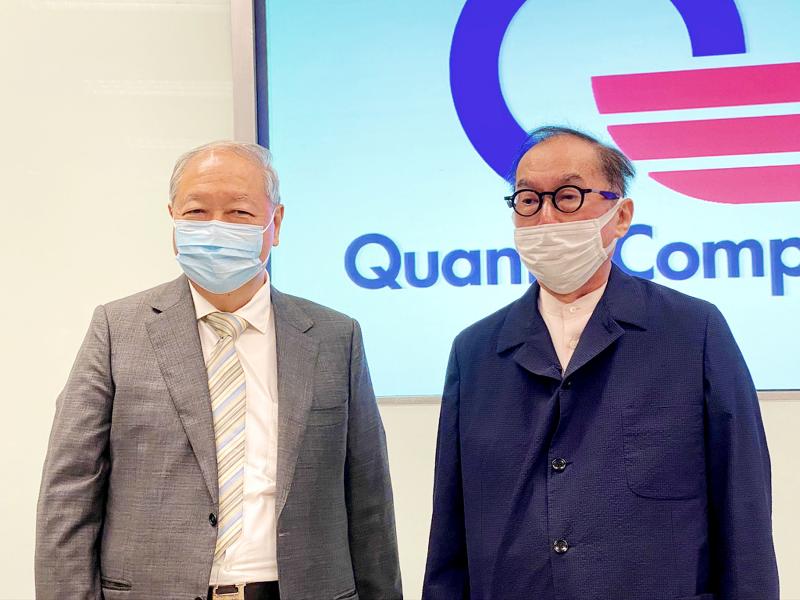Quanta Computer Inc (廣達電腦), the world’s biggest contract notebook computer maker, yesterday reported 57 percent annual growth in net profit in the second quarter, saying that it expects robust laptop demand to drive double-digit percentage growth in laptops shipped this year.
The company’s growth could be compromised by shortages of key components, the company said.
Net profit last quarter expanded to NT$6.25 billion (US$211.61 million) from NT$3.97 billion a year earlier. That represented quarterly growth of 142.4 percent from NT$2.58 billion. Earnings per share rose to NT$1.62, compared with NT$0.67 in the first quarter and NT$ 1.03 a year earlier.

Photo: CNA
Gross margin improved to 6.21 percent, compared with 4.85 percent in the first quarter and 4.77 percent a year earlier.
Quanta shipped 14.5 million laptop computers, a 99 percent increase from the first quarter and a 67 percent increase from a year earlier, benefiting from urgent demand for laptops, Quanta chief financial officer Elton Yang (楊俊烈) said.
“Shipping so much more product is creating economies of scale that let us lower costs,” Yang said, adding that non-laptop sales were also robust.
Laptop demand is likely to remain fierce until the end of this year, Yang said.
“We expect double-digit percentage growth [in laptops shipped] for the second half of 2020, compared with the first half,” Yang said. “We also expect double-digit percentage growth for the whole of 2020, compared with last year.”
“If we can resolve raw material shortages, we might even see a surprise upside,” he added.
Quanta chairman Barry Lam (林百里) told investors that he is optimistic that Quanta can maintain strong growth even after virus-related demand wanes.
“We were worried that we were just seeing a temporary surge, but the demand is getting stronger and stronger,” Lam said. “This confirms that the Otaku [“geek”] economy is here to stay. We cannot make our products fast enough to meet demand due to material shortages.”
Asked about the threat of China developing its own laptop production capability, Lam said that Quanta’s focus on design and innovation differentiates it from companies that simply provide original equipment manufacturing (OEM) services.
“We’ve never been just an OEM. We help our clients realize their ideas. We provide product innovation,” Lam said, adding that he is excited for the new range of product possibilities afforded by 5G technology.

In Italy’s storied gold-making hubs, jewelers are reworking their designs to trim gold content as they race to blunt the effect of record prices and appeal to shoppers watching their budgets. Gold prices hit a record high on Thursday, surging near US$5,600 an ounce, more than double a year ago as geopolitical concerns and jitters over trade pushed investors toward the safe-haven asset. The rally is putting undue pressure on small artisans as they face mounting demands from customers, including international brands, to produce cheaper items, from signature pieces to wedding rings, according to interviews with four independent jewelers in Italy’s main

Japanese Prime Minister Sanae Takaichi has talked up the benefits of a weaker yen in a campaign speech, adopting a tone at odds with her finance ministry, which has refused to rule out any options to counter excessive foreign exchange volatility. Takaichi later softened her stance, saying she did not have a preference for the yen’s direction. “People say the weak yen is bad right now, but for export industries, it’s a major opportunity,” Takaichi said on Saturday at a rally for Liberal Democratic Party candidate Daishiro Yamagiwa in Kanagawa Prefecture ahead of a snap election on Sunday. “Whether it’s selling food or

CONCERNS: Tech companies investing in AI businesses that purchase their products have raised questions among investors that they are artificially propping up demand Nvidia Corp chief executive officer Jensen Huang (黃仁勳) on Saturday said that the company would be participating in OpenAI’s latest funding round, describing it as potentially “the largest investment we’ve ever made.” “We will invest a great deal of money,” Huang told reporters while visiting Taipei. “I believe in OpenAI. The work that they do is incredible. They’re one of the most consequential companies of our time.” Huang did not say exactly how much Nvidia might contribute, but described the investment as “huge.” “Let Sam announce how much he’s going to raise — it’s for him to decide,” Huang said, referring to OpenAI

The global server market is expected to grow 12.8 percent annually this year, with artificial intelligence (AI) servers projected to account for 16.5 percent, driven by continued investment in AI infrastructure by major cloud service providers (CSPs), market researcher TrendForce Corp (集邦科技) said yesterday. Global AI server shipments this year are expected to increase 28 percent year-on-year to more than 2.7 million units, driven by sustained demand from CSPs and government sovereign cloud projects, TrendForce analyst Frank Kung (龔明德) told the Taipei Times. Demand for GPU-based AI servers, including Nvidia Corp’s GB and Vera Rubin rack systems, is expected to remain high,